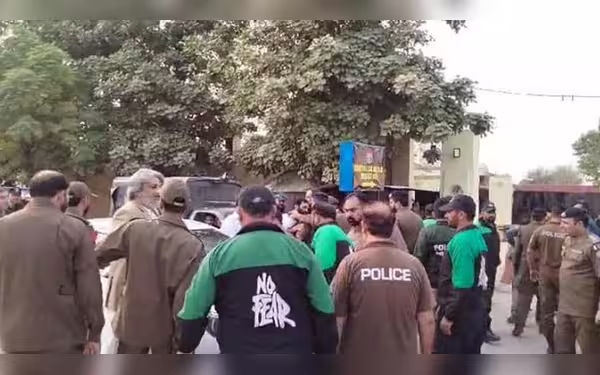Saturday, November 16, 2024 07:48 PM
PTI Leaders and SIC Chief Released After Detention in Punjab
- PTI leaders detained for violating Section 144.
- Detention occurred outside Adiala Jail.
- Political tensions rise amid ongoing protests.
 Image Credits: thenews.com.pk
Image Credits: thenews.com.pkPTI leaders and SIC chief released by Punjab police after brief detention for violating Section 144, raising concerns over political tensions.
In a significant turn of events, the top leadership of Pakistan Tehreek-e-Insaf (PTI) and the chief of the Sunni Ittehad Council (SIC), Hamid Raza, were released by the Punjab police after a brief detention. This incident occurred as the leaders were allegedly violating Section 144 of the Code of Criminal Procedure (CrPC). Section 144 is a law that prohibits gatherings of more than a certain number of people in a specific area, often implemented to maintain public order.
The detained individuals included prominent PTI leaders such as Omar Ayub and MNA Asad Qaiser. They were apprehended while waiting outside Adiala Jail, where they intended to meet with PTI founder Imran Khan. This meeting was anticipated to be crucial, given the current political climate in Pakistan.
The detention of these leaders has sparked discussions about the ongoing political tensions in the country. Many supporters of PTI view this action as an attempt to suppress their political activities, while others argue that it is necessary to maintain law and order. The situation highlights the delicate balance between political expression and public safety.
As the political landscape in Pakistan continues to evolve, incidents like these serve as a reminder of the challenges faced by political parties and their leaders. The release of PTI leaders and Hamid Raza may provide temporary relief, but the underlying issues of political dissent and public assembly laws remain pertinent. It is essential for citizens to stay informed and engaged in the democratic process, as these events can significantly impact the future of governance in Pakistan.
The brief detention of PTI leaders and the SIC chief underscores the ongoing struggle for political expression in Pakistan. As the nation navigates through these turbulent times, it is crucial for all stakeholders to foster dialogue and understanding, ensuring that the voices of the people are heard and respected.













